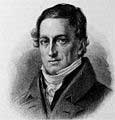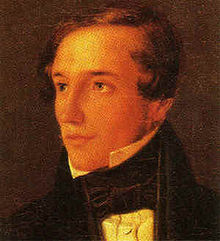|
|
|
|
|
Harry Harlow, née Israel
b. 10-31-1905; Fairfield, IA
d. 12-6-1981
Psychologist Harlow Harlow is best remembered for his maternal-separation and social isolation experiments on rhesus monkeys, demonstrating the importance of care-giving and companionship in social and cognitive development. A former student stated that the animal liberation movement was a result of Harlow's experiments. YouTube- Harry Harlow
|
|
|

Johann Friedrich Herbart
(no commercially available poster)
|
Johann Friedrich Herbart
b. 5-4-1776; Germany
d. 8-11-1841; stroke
Philosopher and psychologist Johann Friedrich Herbart is founder of pedagogy as an academic discipline.
Homeschooled until the age of 12, Herbart went on to become a tutor to the children of a government official which sparked his interest in education, and a professor of philosophy.
Herbart, recognizing the connection between individual development and the potential contribution to society, believed that only formalized rigorous education could provide the basis of moral and intellectural development of “Inner Freedom, Perfection, Benevolence, Justice and Equity”.
Herbart advocated using literature and historical stories rather than “basal readers” as the text, and that teachers use five formal steps in presenting a lesson -
- prepare a topic of interest,
- present the topic,
- inductive questioning,
- deductive evaluation,
- relate material to “moral precepts for daily living”.
• A Text-Book In Psychology
|
|
|
|
|
|
|
Albert Hofmann
b. 1-11-1906; Baden, Switzerland
d. 4-29-2008
Albert Hofmann, a chemist best known for having been the first to synthesize, ingest and learn of the psychedelic effects of lysergic acid diethylamide (LSD).
Albert Hofmann quotes ~
• “Through my LSD experience and my new picture of reality, I became aware of the wonder of creation, the magnificence of nature and of the animal and plant kingdom. I became very sensitive to what will happen to all this and all of us.”
• “Before LSD got onto the streets (in the 1960s), we were able to gather a lot of therapeutic experiences. The substance was used in the psychoanalysis of patients who couldn't be talked to.”
• “I knew immediately that this drug would have importance for psychiatry but, at that time, I would never have believed that this substance could be used in the drug scene, just for pleasure. For me it was a deep and mystical experience and not just an everyday pleasurable one. I never had the idea that it could be used as a pleasure drug.”
|
|
|
|
Karen Horney
née Danielsen
b. 9-16-1885; Hamburg, Germany
d. 12-4-1952; NY
Karen Horney, one of the first women psychiatrists, theorized the striking accomplishments of men in work or some other field can be viewed as compensation for their inability to give birth to children.
Karen Horney Quotes ~
• “Fortunately analysis is not the only way to resolve inner conflicts. Life itself still remains a very effective therapist.”
• “Like all sciences and all valuations, the psychology of women has hitherto been considered only from the point of view of men.”
• “Concern should drive us into action, not into a depression.”
|
|
|
previous page | top | next
psychologists list | a | b | c | d-e | f | g | H-I | j | k | l | m-n | o-p | r | s | t-z
|
|
I have searched the web for visual, text, and manipulative curriculum support materials - teaching posters, art prints, maps, charts, calendars, books and educational toys featuring famous people, places and events - to help teachers optimize their valuable time and budget.
Browsing the subject areas at NetPosterWorks.com is a learning experience where educators can plan context rich environments while comparing prices, special discounts, framing options and shipping from educational resources.
Thank you for starting your search for inspirational, motivational, and educational posters and learning materials at NetPosterWorks.com. If you need help please contact us.
|
|
|








